|
|
|
Sort Order |
|
|
|
Items / Page
|
|
|
|
|
|
|
| Srl | Item |
| 1 |
ID:
128232
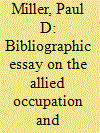

|
|
|
|
|
| Publication |
2013.
|
| Summary/Abstract |
There is no definitive, single-volume history of the Allied occupation and reconstruction of West Germany from 1945 to 1955. This is a significant and surprising lacuna in the literature on US and European history, international relations, and the rapidly growing field in reconstruction and stabilization operations. Scholars, historians, and policymakers need a comprehensive treatment of the German occupation. There is now an opportunity to fill that need. This bibliographic essay reviews the wealth of source material that has become available in recent decades. We can now synthesize primary sources and specialized scholarship to tell the story, for the first time, of how the Allies occupied and rebuilt the western part of Germany.
|
|
|
|
|
|
|
|
|
|
|
|
|
|
|
|
| 2 |
ID:
172136
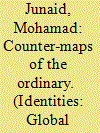

|
|
|
|
|
| Summary/Abstract |
This article examines practices of resistance that thwart Indian state’s control over everyday life in Kashmir. The state frequently uses ‘curfew’ to dominate public space, shut down ordinary mobility, and suppress pro-independence politics. Curfews are enforced through punitive prohibitions and by activating the militarised infrastructure built to reinforce Indian rule over the region since 1947. Yet, Kashmiris are not passive objects of this control. Through overt and hidden practices of resistance and disobedience, like sangbāzi and, what I call, counter-mapping, they keep their aspirations for independence alive, while rebuilding a semblance of everydayness under the occupation. Desire to walk freely becomes the key metaphor for freedom from military control. Based on ethnographic and theoretical material, the article makes a case that in spaces under long-term military occupations political subjectivity is primarily expressed and enacted as a bodily demand to become visible in public space.
|
|
|
|
|
|
|
|
|
|
|
|
|
|
|
|
| 3 |
ID:
171445
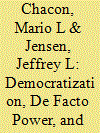

|
|
|
|
|
| Summary/Abstract |
How important is the enforcement of political rights in new democracies? The authors use the enfranchisement of the emancipated slaves following the American Civil War to study this question. Critical to their strategy, black suffrage was externally enforced by the United States Army in ten Southern states during Reconstruction. The authors employ a triple-difference model to estimate the joint effect of enfranchisement and its enforcement on taxation. They find that counties with greater black-population shares that were occupied by the military levied higher taxes compared to similar nonoccupied counties. These counties later experienced a comparatively greater decline in taxation after the troops were withdrawn. The authors also demonstrate that in occupied counties, black politicians were more likely to be elected and political murders by white supremacist groups occurred less frequently. The findings provide evidence on the key role of federal troops in limiting elite capture by force during this period.
|
|
|
|
|
|
|
|
|
|
|
|
|
|
|
|
| 4 |
ID:
126865
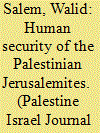

|
|
|
|
|
| Publication |
2011.
|
| Summary/Abstract |
The article presents the author's views concerning the safety and security condition of several Palestinian Arabs in East Jerusalem. The author mentions the move of the Israeli government for these settlers by implementing policies through military occupation. The author cites the challenges faced by Palestinians due to the ailing condition of their security. The marginalization enforced for Palestinians is also noted.
|
|
|
|
|
|
|
|
|
|
|
|
|
|
|
|
| 5 |
ID:
004191
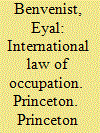

|
|
|
|
|
| Publication |
Princeton, Princeton University Press, 1993.
|
| Description |
vii,241p.
|
| Standard Number |
0691056668
|
|
|
|
|
|
|
|
|
|
|
|
Copies: C:1/I:0,R:0,Q:0
Circulation
| Accession# | Call# | Current Location | Status | Policy | Location |
| 034814 | 341.66/BEN 034814 | Main | On Shelf | General | |
|
|
|
|
| 6 |
ID:
055576
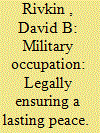

|
|
|
| 7 |
ID:
116578
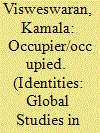

|
|
|
|
|
| Publication |
2012.
|
| Summary/Abstract |
As military occupation increasingly informs the politics of both democracies and dictatorships, capitalist and socialist regimes, this essay asks why it is foundational for sovereignty and the post-war state-form. In particular, it questions the complicity of post-colonial theory with security discourses in reading movements for self-determination as threats to the state or as forms of terrorism rather than as alternate possibilities for freedom and liberty. It suggests not only that the ongoing twenty-first century relations between occupier and occupied reprise the racialised forms of identity that characterised relations between coloniser and colonised in the preceding two centuries, but also that relations between occupied peoples may produce affiliative poetics and shared terms of political reference or solidarity.
|
|
|
|
|
|
|
|
|
|
|
|
|
|
|
|
| 8 |
ID:
144594
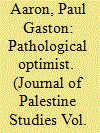

|
|
|
|
|
| Summary/Abstract |
This short biography of Dr. Eyad El Sarraj, the founder of the Gaza Community Mental Health Programme, describes his formative experiences under Israeli occupation, his education, and his professional life, including interactions with Palestinian and Israeli colleagues. El Sarraj's vision of collective resistance, his stubborn ‘pathological optimism,’ and his devotion to the dignity and well-being of his patients and the people of the Gaza Strip in the face of unrelenting Israeli state violence are colorfully described by his colleague and long-time friend Paul Aaron.
|
|
|
|
|
|
|
|
|
|
|
|
|
|
|
|
| 9 |
ID:
178343
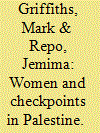

|
|
|
|
|
| Summary/Abstract |
The objective of this article is to bring Palestinian women to the centre of a discussion about the gendered dimensions of Israel’s convoluted permit system and checkpoint security infrastructure. Drawing on fieldwork close to one of the largest checkpoint terminals in the West Bank, Checkpoint 300 between Bethlehem and Jerusalem, the article develops knowledge about checkpoints in three important ways: i) as gendered spaces that regulate women’s mobility differently from that of men; ii) as spaces that produce particular embodied experiences for women; and iii) as security mechanisms that disrupt and regulate relations of care. This knowledge builds towards the main argument of the article: Palestinian women’s lives are profoundly affected by Israel’s imposition of permit systems and checkpoints in terms of highly gendered impositions of (im)mobility, embodied experience and relations of care. The research presented here thus makes two wider contributions to research on security to do with how the checkpoint brings the politics of gender and occupation to the fore, and how security infrastructure connects to the politics of care under military occupation.
|
|
|
|
|
|
|
|
|
|
|
|
|
|
|
|
| 10 |
ID:
130504
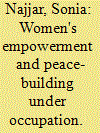

|
|
|
|
|
| Publication |
2011.
|
| Summary/Abstract |
As a contribution to the discussion on women's empowerment in the Palestine-Israel Journal, this article reflects on the possibilities for women's empowerment and peace-building under a condition of prolonged occupation. Specifically, it focuses on the near-impossibility of the manifestation of empowerment and peace for those who have been disenfranchised under a paradigm of extreme oppression in the context of Occupied Palestine. If one uses Eileen Kuttab's contextualization of Palestinian empowerment as historically being embodied in practices of mobilization and resistance, then being allowed neither mobility nor the right to organize resistance to Israeli military violence makes it clear that the prospects for successful peace-building and the realization of Palestinian women's empowerment face significant obstacles.1 This is a result of the autocratic imbalance of power that has seeped from external into internal dynamics. The external factors are the architects and participants of the occupation comprised of an illegal Israeli military occupation force of women and men, abetted by an international community that does not adhere to its mandates to the fullest extent and follows an aid praxis that further serves to annihilate mobilization and resistance. The internal obstacles to women's empowerment are an extension of the external, that is, elements of the Palestinian local governing structure that was meant to be temporary in nature.
|
|
|
|
|
|
|
|
|
|
|
|
|
|
|
|
|
|
|
|
|